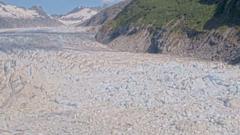In a rapidly developing situation, residents in Alaska are responding to evacuation orders due to fears stemming from the Mendenhall Glacier's melting ice. Officials are concerned about the potential for record-level flooding as meltwater escapes from a dammed basin into the Mendenhall River, posing a threat to the capital city, Juneau. The National Weather Service (NWS) has rolled out a flood warning, highlighting that water levels had already surged to alarming heights.
On Tuesday, local authorities had alerted residents of possible evacuations; by the next morning, water levels exceeded 16 feet—well above the critical flooding threshold of 14 feet—suggesting a significant geological event. Meteorologist Nicole Ferrin indicated at a press briefing that this situation could lead to unprecedented flooding levels, saying, “This will be a new record, based on all the information we have.”
The NWS provides insights into glacial lake outbursts, likening the flooding risk to unplugging a full bathtub. When rain and melting snow cause lakes to fill, they can breach the glacier barriers holding them, leading to rapid and potentially devastating outflows. Such natural phenomena have historically plagued the area; flooding concerns have been pronounced in Juneau since 2011, with destructive floods reported in 2022 alone that resulted in damage to numerous properties.
To curb the impending disaster, Alaska Governor Mike Dunleavy declared a state disaster on Sunday, emphasizing the "imminent threat of catastrophic flooding from a glacier lake outburst flood in the Juneau area." As the situation evolves, emergency responders and citizens alike are bracing for the worst while authorities continue to monitor the glacial dynamics closely.
On Tuesday, local authorities had alerted residents of possible evacuations; by the next morning, water levels exceeded 16 feet—well above the critical flooding threshold of 14 feet—suggesting a significant geological event. Meteorologist Nicole Ferrin indicated at a press briefing that this situation could lead to unprecedented flooding levels, saying, “This will be a new record, based on all the information we have.”
The NWS provides insights into glacial lake outbursts, likening the flooding risk to unplugging a full bathtub. When rain and melting snow cause lakes to fill, they can breach the glacier barriers holding them, leading to rapid and potentially devastating outflows. Such natural phenomena have historically plagued the area; flooding concerns have been pronounced in Juneau since 2011, with destructive floods reported in 2022 alone that resulted in damage to numerous properties.
To curb the impending disaster, Alaska Governor Mike Dunleavy declared a state disaster on Sunday, emphasizing the "imminent threat of catastrophic flooding from a glacier lake outburst flood in the Juneau area." As the situation evolves, emergency responders and citizens alike are bracing for the worst while authorities continue to monitor the glacial dynamics closely.






















